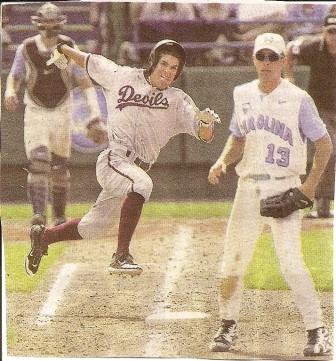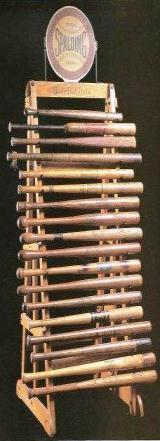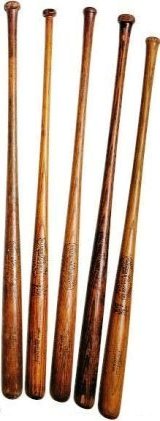Who's responsibility is it to tell the runner if a fly ball is an out or a ball in play?
by Mandy
(Gig Harbor, WA)

Keeping the pressure on the defense
Mandy asked: My son hit a deep fly ball to left field. He ran the baseline to first base and thought that he heard the umpire yell "out".
In actuality, the ball bounced in front of the fielder and when my son looked up, the ball was in his glove, and he was starting to throw the ball in.
My son hit the bag and turned to run back to the dugout. His first base coach said nothing. His head coach on 3rd base said nothing. The dugout said nothing.
The coach of the other team caught it and had them throw it from deep left all the way to first to get my son out.
Those coaches had a long time to yell BACK!, but never did. When I called it a coaching error, they said that the runner should be watching the ball. When I mentioned it, the first base coach said that he said "Nice hit", but that is exactly what he would say to a well hit fly out.
Who is at fault?
Rick answered: Mandy, thank you for your question.
Sounds like your son's team had a baserunning "perfect storm". Everything that could have gone wrong, did!
I wouldn't look at it as an individual responsibility, it is ultimately a team responsibility.
In the picture above, the batter has hit a ball into right field. He is full out, reading the play develop in front of him and making his decision on what he will do.
While he has the ball in front of him, he can do the same thing with a ball anywhere in the outfield.
At the same time, the first base coach who is not in the picture is doing the same thing and letting the runner know what he wants him to do, two entities working together.
In your situation,the batter hit a deep fly ball to left field. Off the bat he knows the ball is going to the outfield and he should be running as hard as he can, looking to make his turn at 1B and go to 2B, should the ball drop or be misplayed by the outfielder.
The batter should be tracking the ball off the bat, looking down to make sure he touches first base; but getting his eyes right back up, reading the play in the outfield and making his decisions based on what he sees. He has two options, stop and shuffle back to first base, still watching the outfielder as he makes his throw back into the infield, or continuing on to second base.
While the batter is taking care of his responsibilities, the first base coach would be telling him to make his turn and take a look, stop him or send him, depending on what happens in the outfield.
If the outfielder comes up with the ball cleanly, stop him and back to first.
A bobble, slowness getting to the ball, backhanding the ball, any little edge provided by the outfielder tells you to take a shot at second; but only if the batter has put himself in position for that shot by hustling out of the box.
It is an old Baseball Axiom, doubles and triples are made "out of the batter's box".
If just those two entities, batter and first base coach, work together in this situation, it eliminates the confusion that occured. It is all a part of onfield communication, an essential building block of teamwork.
The third base coach should never have to be an active part of this play. Once it played out as it did, he had the opportunity to alert the batter that the ball had dropped in, as did the first base coach and all the players in the dugout.
Players and coaches need to have each other's back. All you have on the field are each other, the other team will not be looking out for your best interests.
Things, at times, don't always go as planned in the course of a game, it's the nature of baseball. Teamwork and comradery are the glues that hold the individual players and coaches together, when it seems like things are falling apart all around them. They get you through the rough times.
If you are playing or coaching this game, you will make mistakes. It comes with the territory. When teammates and coaches pick each other up, the team is able move forward and special things happen, memories made and never forgotten.
Good luck as you move forward. You are building family memories with your son that will last a lifetime.
Yours in baseball,
Rick



